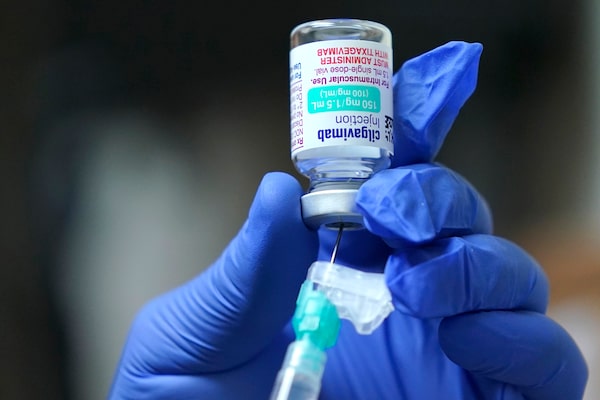
A medical assistant at a University of Washington Medicine clinic, prepares a two-shot dose of AstraZeneca's Evusheld, the first set of antibodies grown in a lab to prevent COVID-19, on Jan. 20.Ted S. Warren/The Associated Press
Canada has approved a drug designed to protect people with compromised immune systems against COVID-19, marking the first time that federal health officials have authorized a prophylactic pharmaceutical for the coronavirus.
Health Canada on Thursday approved Evusheld for people aged 12 and over, so long as they meet certain criteria. The announcement was made just one day after Alberta became the most recent province to drop another drug, known as Sotrovimab, owing to concerns about efficacy against the latest subvariant, eliminating one of the few approved treatments for the virus.
The Evusheld authorization gives vulnerable citizens, including transplant patients, a degree of protection that may be unavailable to them through vaccination. Prospective patients must be unlikely to mount an adequate immune response to COVID-19 vaccines, or be among the few for whom vaccination is not recommended. Unlike existing treatments, the drug is approved only for those who are not infected with COVID-19 and have not had recent contact with an infected person.
Health Canada noted AstraZeneca’s Evusheld is not a substitute for vaccines. The company must continue to submit the drug’s safety and efficacy information against current and emerging variants of concern.
Drug trial data released in November showed an 83-per-cent reduction in the risk of developing symptomatic COVID-19 compared with a placebo after about six months.
“Based on laboratory studies, Evusheld is expected to retain neutralizing activity against Omicron subvariant BA.2, which is now the dominant variant in many communities in Canada,” Health Canada said in a statement. Canada has already signed an agreement with AstraZeneca to receive 100,000 doses this year.
While a vaccine effectively teaches the body to make its own antibodies over a short period of time, Evusheld delivers ready-made antibodies to immediately start fighting off the virus. The antibodies are delivered as two separate injections.
The virus’s evolution can quickly stymie once-effective treatments. On Wednesday Alberta suspended use of Sotrovimab, a monoclonal antibody delivered intravenously, because it is not effective against Omicron subvariant BA.2.
Alberta treated 1,644 people with Sotrovimab between November 2021 and April 11, 2022. The province has 2,050 treatments in inventory, according to Alberta Health spokeswoman Lisa Glover. The federal government procured and distributed the doses.
Ontario also recommends against Sotrovimab, which it said costs about $2,000 a dose. British Columbia bumped the product from its top options as well, noting it could still be used as a “last-line agent.” Saskatchewan discontinued the drug last week.
Other treatment options – Paxlovid, an oral antiviral treatment; and Remdesivir, delivered by IV – remain available to certain patients, such as immunocompromised adults and those who are not fully vaccinated.
Alberta Health Minister Jason Copping said on Wednesday that BA.2 will put “increased pressure” on the health care system in the coming weeks, but it is not expected to rival the wave that crushed hospitals in December and January. The province, he said, is working to increase vaccination rates and broaden access to Paxlovid, which became available in the province at the end of January, and “future therapeutics.”
“That’s what it means to transition to living with COVID-19,” he told reporters. “Not denying it or minimizing it, but controlling it and at the same time doing the other work we need to do.”
As of Monday, Alberta had dispensed about 720 Paxlovid prescriptions, Mr. Copping said, adding that the province has about 16,000 courses of treatment available, with another 21,000 arriving this month. Alberta also has up to 1,085 Remdesivir treatments available, and another 7,000 vials allocated that can be procured as needed, Ms. Glover said.
Lynora Saxinger, an infectious-diseases physician who is a member of Alberta Health Services COVID-19 advisory group, said that while Paxlovid is convenient, the drug is rife with interactions and not always suitable for transplant patients. Remdesivir, meanwhile, requires infected patients to receive IV treatments over three days.
Dr. Saxinger believes scores of Albertans who are eligible for treatment are missing out because they are unaware they qualify. The drugs require a lab-confirmed positive COVID-19 test, which are no longer widely available. However, residents who meet the standard to receive a test likely qualify for the drugs. Because the criteria for accessing tests and drugs are in flux, she encouraged people with symptoms to check whether they are eligible for a lab test.
“Then you would have a way in to get treatment,” she said.
With files from The Canadian Press
We have a weekly Western Canada newsletter written by our B.C. and Alberta bureau chiefs, providing a comprehensive package of the news you need to know about the region and its place in the issues facing Canada. Sign up today.
 Carrie Tait
Carrie Tait